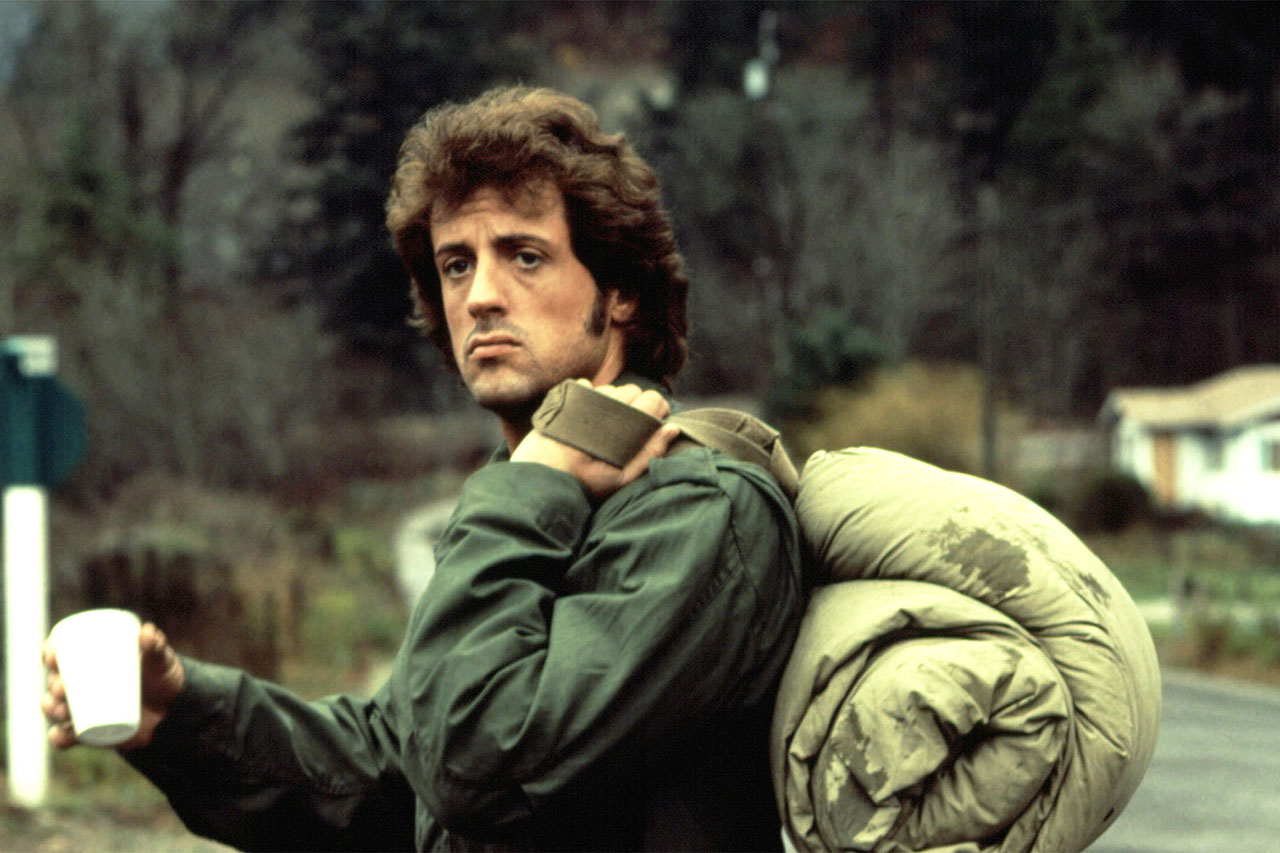 |
| Don't push it, or I'll give you a war you can't believe. |
Growing up in the 80s, surrounded by larger-than-life action heroes, one of my favorite films was First Blood. The first in what would become the “Rambo series” was my favorite, darker and more serious than its sequels. First Blood and John Rambo became a minor obsession among my friends, one of whom got hold of a “special forces” knife with the wicked serrated back edge and a hollowed-out handle where he stored a needle and thread—just in case we needed battlefield stitches. You never know.
As most know First Blood tells the story of a special forces soldier, John Rambo (played wonderfully by Sylvester Stallone), coping with post-traumatic stress syndrome from a brutal stint in Vietnam in which he was captured and tortured. Now stateside and adrift, a post-war vagrant, he just wants to be left alone, but quickly runs afoul of an overzealous small-town chief of police (Brian Dennehy), who ushers him unceremoniously out of town.
Pushed too far and humiliated, Rambo refuses to acquiesce, and turns back. That sets in motion the events of the rest of the film—a rousing jailbreak, a cat-and-mouse game in the mountains of Washington State with Rambo using his survival skills honed as a Green Beret to maim (but not kill) his pursuers.
I loved the film, and still do. But all this time I had never read the book upon which it is based—David Morrell’s First Blood. Published in 1972, it was out a full 10 years before the film adaptation, which spent the better part of a decade in “production hell” before finally making it to the silver screen.
I recently got a hold of a copy of Morrell’s novel and rectified that, burning through a read in all of 2 nights. I enjoyed the heck out of it and was surprised by the differences from book to film. Chiefly, that Rambo turns on a blood spigot and kills at least 20 of his pursuers, maybe more. Holy hell there is a lot of killing, including a pack of dogs hard on his scent. There is also more characterization. Teasle, the police chief, is portrayed far more sympathetically and three-dimensionally in the book than the film. Morell places a heavy emphasis on his service in the Korean War, a sad separation from his wife, and his obsession and eventual identification with Rambo. I won’t spoil the ending but that is also quite different, and much grimmer, than we see in the film.
Otherwise the movie follows most of the major beats of the book.
 |
I have this edition...
but not the knife. |
Make no mistake, like the film the book is mainly pure action, unrelenting page-turning glory. There is a deeper and more serious undercurrent, commentary on the invisible scars soldiers often bear (made doubly hard on the veterans of the war in Vietnam, an unpopular and unfavorable conflict that most of the U.S. populace either wanted to sweep under the rug and forget, in some cases treating its returning Veterans with disdain). But principally it grabs you from the opening page with a compelling pace and refuses to let up with its action.
As a sword-and-sorcery fan headlong action and violence is part of what I enjoy in my reading. And First Blood scratches the same itch. In fact, outside of being set in modern times, there are several S&S parallels—an outsider protagonist, suffused with gray, wandering from place-to-place. Low stakes/survival plot. We even get a “dungeon crawl,” a hair-raising sequence in a cave where Rambo encounters filth and bats, rats, the skeleton of an unlucky miner. And a final showdown with Teasle and his men. The equally shared POV between Rambo and Teasle is not something we typically see in S&S but it could work.
Near the end of the book Colonel Trautmann, architect of Rambo’s Green Beret training (played in the film by Richard Crenna), offers up an interesting commentary on why the modern age is anathema to sword-and-sorcery heroes. With the manhunt in full swing, Trautmann—who is both helping Teasle capture Rambo, while also admiring his pupil’s incredible survival skills—laments the coming “machine” that will spell the end of heroism:
“In a few years a search like this won’t even be necessary. We have instruments now that can be mounted on the underside of an airplane. To find a man all you need to do is fly over the spot where you think he is, and the machine will register his body heat… a man on the run won’t have a hope. And a man like me, he won’t be needed. This is the last of something. It’s too bad. As much as I hate war, I fear the day when machines take the place of men. At least now a man can still get along on his talents.”
Morrell, now 78, has lived an interesting life. A former university professor, he gave up his tenure to pursue a career as writer. First Blood earned him a handsome payout from the movie rights and he went on to write novelizations of the ensuing films. He also wrote horror (winning an award from the Horror Writers Association), non-fiction, and for the comics (Captain America, Spider-Man, Wolverine). A pretty cool mid-list author success story, increasingly rare these days.






